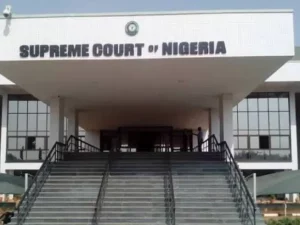
In this interview with Vanguard’s Law & Human Rights, a respected member of the inner bar, consummate constitutional lawyer and former Abia State Attorney-General and Commissioner of Justice, Prof Awa Kalu, SAN, highlighted some fundamental issues with the July 11, 2024 decision of the Supreme Court which granted financial autonomy to 774 local government councils in the country.
The Supreme Court judgement on local government autonomy was roundly praised by stakeholders when it was delivered on July 11, 2024. But almost three months after its delivery, it does appear that the judgement remains a paper tiger. How do you react to this?
Neighbor recounts how woman abused 12 years old niece, burnt her with hot knife and forced…..0:00 / 1:00
Yes, I’m aware many people who did not understand the constitutional basis of the judgement praised it. They did so based on their understanding of the judgement and the constitution. They can praise it if they want to. You said the judgement appears to be a paper tiger. Yes, it has to be, so far as the judgement pretends to overrule what the 1999 Constitution of the Federal Republic of Nigeria expressly provided for. It will remain a paper tiger if it has become so already.
What I do not agree with in the judgement is the attempt to bifurcate the totality of the intent of the framers of the constitution in Section 162 of the 1999 Constitution. This is because what the Supreme Court has done in its judgement in that case is to demote the word “Shall” in the subsections of the constitution that refer to the state but has maintained “Shall” in the subsections that pertain to the Federal Government.
For emphasis, Section 162 (1) provides that the Federation shall maintain a special account to be called “the Federation Account” into which shall be paid all revenues collected by the Government of the Federation, except the proceeds from the personal income tax of the personnel of the Armed Forces of the Federation, the Nigeria Police Force, the Ministry or Department of Government charged with the responsibility for foreign affairs and the residents of the Federal Capital Territory, Abuja.
Section 162 (3) provides that any amount standing to the credit of the Federation Account shall be distributed among the Federal and State Governments and the Local Government Councils in each state on such terms and in such manner as may be prescribed by the National Assembly.
Section 162 (4) says any amount standing to the credit of the states in the Federation account shall be distributed among the states on such terms and in such manner as may be prescribed by the National Assembly while section 162 (5) says “the amount standing to the credit of local government councils in the Federation Account shall also be allocated to the States for the benefit of their local government councils on such terms and in such manner as may be prescribed by the National Assembly.
Section 162 (6) goes to say “each state shall maintain a special account to be called State Joint Local Government into which shall be paid all allocations to the local government councils of the state from the Federation Account and from the Government of the State.
Now, the Supreme Court, in the judgement, has maintained shall as ordinarily understood in the sections that concern the Federal Government but has not done the same for subsections that apply to the state.
What do you think the Supreme Court should have done?
The Supreme Court should have interpreted section 162 consistently. That is to say, it should have interpreted “Shall” with regards to subsections that affect the state governments the same way it interpreted “Shall” for the subsections that pertain to the Federal Government.
Put differently, Section 162 concerns appropriation of revenues to the Federal Government as well as the state governments. In the attempt to separate the federal government from the states, the judgement attempts to separate the federal government as a separate government and then look at the state governments differently in terms of the use of the word “Shall”. The word “Shall” is mandatory. So, the “Shall” that concerns the subsections that deal with the Federal Government has been separated from the “Shall” that applies to the subsections that relate to the states.
Whereas, the Supreme Court itself has said that in interpreting any section of the constitution that contains subsections, the subsections must be interpreted uniformly. So, if you look at section 162, it has subsections. Some of them (subsections) concerning the revenues belonging to Federal Government with some of the subsections particularly from subsection 5 concerning revenues belonging to the states. And the Supreme Court interpreted the sections that apply to the Federal Government as Shall and goes on to say you can use “Shall” in place of “May” or you can interpret “Shall” as you interpret “May” in the subsections that apply to the states. So, they created that dichotomy. And that is where my disagreement arises.
In clear terms, and notwithstanding the area of the disagreement you pointed out, how can that judgement be made effective?
I personally do not support the judgement. I don’t know how it will become effective. What you see now is scampering amongst the states to hold elections. Meanwhile, I don’t know any state you can say has the budget for local council elections this year. I don’t know any. What you are creating is an extraordinary budgeting situation for those states who do not have a budget for local government elections this year.
Two, that judgement has a long-term effect of creating unitarism. So, if responsibility has been assigned to the states and you transfer the responsibility to the Federal Government, there is serious danger ahead.
There are even existing authorities from the Supreme Court judgement that the Federal Government cannot impose any obligation on the state unless the constitution by itself has created that obligation.
Senior lawyers had, many at times, in the past, talked about judicial legislation. Don’t you think what the Supreme Court did in the case in question amounts to judicial legislation to solve a problem?
Judicial legislation is abhorred. In law, judicial legislation is not admissible. That is what the law says. What the judiciary is for is to interpret the law not to make it.
But the Supreme Court is a policy court with powers to make policy decisions?
You create policy out of the law. The role of the Supreme Court in policy making is to look at the law and then create policy to interpret the law; not to ignore the law and then make policy. That is my own view about policy making. You have to look at the framework of the law and then you create policy.
But in this particular case, there has been a problem. The issue has been that the state governors have been cornering the allocations of local councils under them?
That is a separate consideration. If the law says “X”, you can’t then import “Y” for you to clarify what “X” means. The question is: does the constitution envisage that in dealing with the local government, you can bypass the state? There is a Supreme Court decision saying clearly that the responsibility for the management of the state lies with the state government. It is a decision of the Supreme Court. And so, when you are now looking at Section 162, you cannot jump over section 7 of the 1999 constitution.
Section 7, if you read it by yourself, does not require any judicial interpretation. The section clearly assigns to the state the powers to regulate the local government councils. Number one, it is the state government that creates the enabling law for the management and regulation of local government. You cannot jump over section 7. I have read the judgement. I’m not speculating.
So, where has the Supreme Court goofed?
I didn’t say they have goofed. What I am saying is that I don’t associate with that judgement. They have given their reasons for the judgement. And I have simply, as a lawyer, disagreed with their judgement.
Chief Samuel Okutepa, SAN, a firebrand advocate, in an opinion published online, said the judiciary appears to have effectively blocked access to electoral justice in Nigeria by the kind of judgments it gives in most cases in electoral jurisprudence. Do you agree with him?
I have not seen the opinion with my koro-koro eyes. I don’t know whether it was published or not.. And I don’t know whether there is a reference to any particular judgement in the said opinion or whether there is a reference to any particular court. Yes, electoral processes, judgments, have in some ways been confused. But I don’t know whether to put the blame on the judiciary or on the part of any particular case he has referred to. Okutepa is a brilliant young man. He is my friend. I can’t oppose his view without seeing the opinion with my eyes.
From your own personal experience, with the kind of judgments that had been given in the past on some electoral matters, would you say that the judiciary has actually blocked access to electoral justice?
I’m not going to put it that way. This is because lawyers differ in the language they use in conveying their opinions. One, if there is a reference to a particular judgement, I would like to see that judgement and interpret it in the light of the facts that led to the law. It is the facts that generate the law. So, I’m not going to give a blanket interpretation on all cases that have been decided by the judiciary. They are in the thousands now. So, if there is a concrete reference to a particular case, I will like to isolate the case and give my opinion about it. You know, you asked me a question about a particular case earlier. And I have said that as a lawyer that has been in existence in the past 46 years, I don’t believe in that particular judgment. But I’m not going to generalize that.
 DailyrecordNg …Nigeria's hottest news blog
DailyrecordNg …Nigeria's hottest news blog








